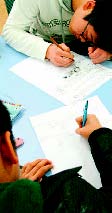Learning English is the top priority for many parents in South Korea, says ANDREW FARRELL
 Korea’s transformation from an agriculture-dominated military dictatorship to a G20 nation has left many legacies in the country, some of them negative. There is, for instance, a consensus among many foreigners here that the country developed too quickly industrially for society to catch up. Whether you agree with this is another issue, but one could point to a dozen examples of Korean social norms that leave westerners scratching their heads in bemusement.
Korea’s transformation from an agriculture-dominated military dictatorship to a G20 nation has left many legacies in the country, some of them negative. There is, for instance, a consensus among many foreigners here that the country developed too quickly industrially for society to catch up. Whether you agree with this is another issue, but one could point to a dozen examples of Korean social norms that leave westerners scratching their heads in bemusement.
What you can’t fault is the (almost) religious adherence to studying the English language, especially for Korea’s future professionals. But the age at which they start their studies, and the daily time learning English, is head-spinning. Classes begin at 9.40am in my private English school, and the regular kindergarten schedule ends at 2.40pm, but parents have the option to keep their children in until the doors shut after six.
Students are enrolled at four years of age and stay until they are eight. From the age of six, the better pupils move to ‘special classes’ which means that for five straight hours they learn nothing but English. With plenty of after-school programmes available, their parents can choose from some Korean lessons, ballet, science – or more English. The latter option is undoubtedly the most popular.
It costs an amazing US$600 per month to have your child in a ‘special class’ ($500 for a regular class) and parents will literally fight with the school authorities to have their child taught by two native speakers, rather than just one.
Many of the children will do extra lessons elsewhere on Tuesdays, Wednesdays and Thursdays from 9pm until midnight, with maths classes taking place on Saturday mornings.
With all this time, effort and money, it’s important to discuss their level. My seven-year-old ‘special class’ students are currently learning abbreviations, plural nouns and how to write a diary in English. They know how to tell the time and have a firm understanding of the past, present and future tense. They never speak Korean in class, and have some amusing conversations with each other in English; my favourites include two boys debating how lizards “have babies” and listening to the entire class speculate what happens when “grandfather dies”.
One Korean colleague, who spent five years teaching in the US, believes that her students are far better at writing English than their American counterparts, and are almost their equals at reading. The American children are more competent speakers, however.
Given Korea’s strong cultural links with the US and Canada, there is no doubt preference for native speakers from those countries. It’s not uncommon for Korean English teachers to spend a few post-uni years in North America, then return to their homeland in search of a well-paid teaching job.
The outcome of this cultural crossover is that I, as an Irishman speaking British English, am teaching the children certain words differently to my colleagues.
My Irish accent has also caused some confusion. The adults may speak English well, but it’s clear some have had little exposure to different accents and speech patterns. One teacher once told me she could understand “about 40 per cent” of what I said, and after observing one of my classes the head teacher encouraged me to “perform a New York accent”.
I refused – the kids may be young, but they’d never fall for that. Even so, I got to dine out on the story for a while.
Andrew Farrell is working as an English language teacher in Korea











